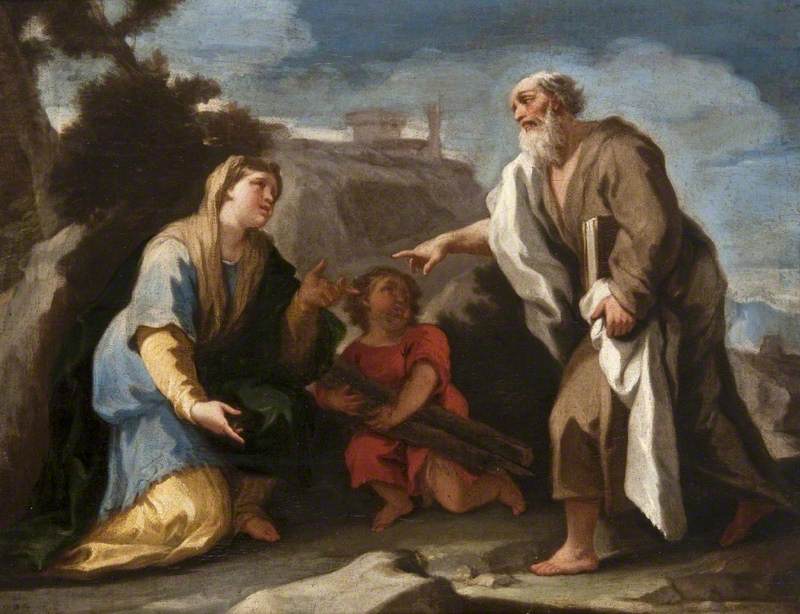Tonight, we are beginning our study of the prophet Elijah. Please read and re-read 1 Kings 16:30 – 17:24, and bring your Bibles with you tonight.
Biblical Interpretation:
Going back to the Apostle Paul, the Church has traditionally employed several methods of interpreting the Old Testament. We looked at Paul’s method of biblical interpretation in our previous discussion of Galatians 4, where Paul specifically says that the story of Hagar and Sarah should be interpreted allegorically.
In his work Conferences (ch.8), John Cassian (360-435) sets forth the three non-literal means of biblical interpretation that will come to guide the church. These interpretations are (1) the allegorical/typological sense where events from the Old Testament are seen as prefiguring aspects of the New Testament, (2) the moral/tropological sense where moral lessons can be drawn from the Old Testament, and (3) the anagogical/eschatological sense which speaks of the here-after or end times. For example, Jerusalem is a historical city; it is allegorically the church as exemplified by Sarah (Gal. 4:26); it is the moral imperative to create a just society (Wm. Blake’s Jerusalem); and it is our eschatological home (Rev. 21).
The medieval church summarized these interpretative methods in the following quatrain:
The letter shows us what God and our fathers did;
The allegory shows us where our faith is hid;
The moral meaning gives us rules of daily life;
The anagoge shows us where we will end our strife
All of these traditional interpretative strategies, go back to Jesus’ statement that the Old Testament can only be properly understood as bearing witness to him, and Paul’s statement that it is only in the light of the risen Christ that the Old Testament may be appropriately interpreted. John 5:29, 2 Cor. 3:16. Most of our discussion this week will concern how we see Christ in these stories. Therefore, we must read these stories prayerfully, with an open heart, and under the guidance of the spirit.
An Apocalypse:
As will become more explicit next week in the Contest on Mount Carmel (1 Kings 18:20-40), the beginning of the Elijah story is apocalyptic. Our story begins as a battle of Yahweh v. Baal. In Canaanite mythology, Baal is the Storm God who brings rain and dew, and Elijah closes up the heavens showing that it is his God who is in charge. This initial salvo in the battle between Elijah’s God and Jezebel’s God foreshadows Jesus’s battle with the demons and evil, particularly in Mark and Revelation. In this way, Elijah’s story is very much Jesus’s story as well.
Jesus and the Widow of Zarephath:
In the story of the widow, we should see numerous typologies related to Jesus. At the very beginning of his ministry when his hometown of Nazareth rejects him, Jesus uses the story of Elijah going to a Gentile widow (and not an Israelite widow) to show that he too would need to go outside of his townspeople. Luke 4:25. Like Elijah, we will see Jesus continually engaging in ministry with non-Israelite women – Samaritan and Canaanite (from Sidon). John 4, Matt. 15:21-28. Jesus fulfills Elijah’s ministry of going to those outside of Israel.
Advent:
In our reading tonight, we should also see a glimpse of the Christmas story. To quote Richard Beck: It’s a humble and intimate story. God working through small things – birds and the small gifts of a poor widow. The characters are mundane, and the location is marginal. Small people doing small things in unlikely places. And through them, God invades enemy-occupied territory to bring dead things back to life. . . Power is exercised through the birds of the air, small gestures, meager resources, feeble words, human obedience, and the witness of a poor woman. Through such lowly means, God’s work gets done, even in the most hostile of places.
An Abundance of Faith:
There is also a wonderful moral aspect to the Widow of Zarapheth. Her story takes place in a world of deathly scarcity and marginalization. In this world, the widow shows her faith in sharing what little food and shelter she has. In that sharing, however, God blesses her with abundance. We also see this faith which translates scarcity into abundance in the Feeding of the Five Thousand. Just like the widow’s handful of meal and few drops of oil will feed her until the rains come, so do five loaves and two fish feed the multitude.
Read through the stories today and see where you see Jesus. See what lessons you can draw into your own life from that of the widow’s.
Dinner is at 6. The menu is turkey chili. Discussion around 6:45. Compline at 8. Hope to see you here.
Father of orphans, defender of widows, *
Psalm 68:5-6
God in his holy habitation!
God gives the solitary a home and brings forth prisoners into freedom; *
but the rebels shall live in dry place.

